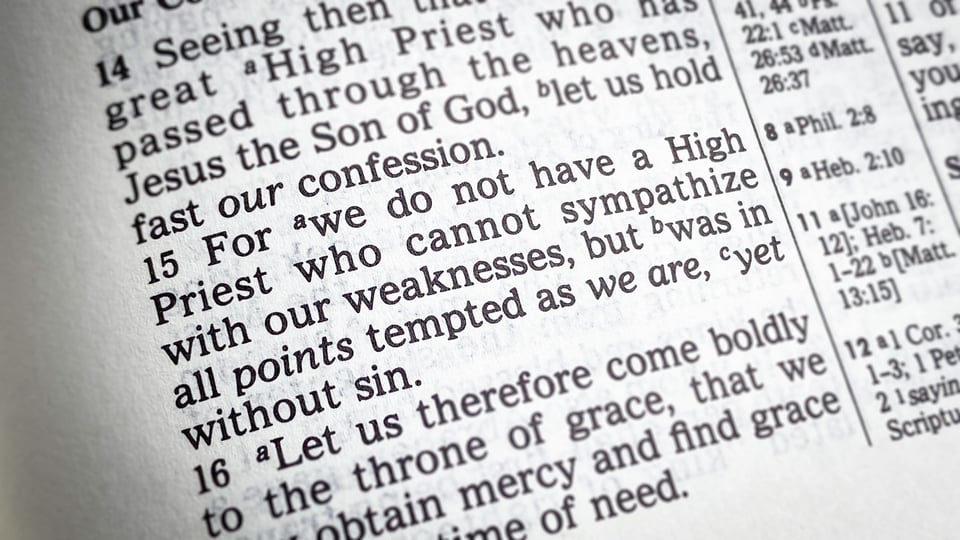Jesus Christ, Our High Priest: What Is the Meaning of Hebrews 4:15?
What does Christ’s title as High Priest tell us about who He is and what He has done? What hope does Hebrews 4:15 give us? How does it affect you?

What does Hebrews 4:15 say?
“For we do not have a High Priest who cannot sympathize with our weaknesses, but was in all points tempted as we are, yet without sin.”
According to Hebrews 4:15, in addition to being our Savior, Jesus Christ is our High Priest, who is on the job night and day.
But how did Jesus Christ qualify to become a high priest? What does a high priest do? How does this all relate to you?
What is the meaning of Hebrews 4:15?
How did Jesus fulfill the role of priest and high priest?
Some 1,500 years before the events of the first century, the God of heaven and earth handpicked a relatively small and downtrodden group of people to be His special people.
They were descendants of Abraham, Isaac and Jacob. We know them as the nation of Israel.
God told them to build a structure in the middle of their camp for Him to live in as a sign of His special presence among them. The building, initially a tabernacle and later a temple, was a place of worship where the people could come near to God (Numbers 16:4-9).
Priests were essentially the mediators, or the go-betweens, who facilitated the relationship between God and man.
But the fact remains, God is holy and people are sinful. Adam and Eve’s decision in the Garden of Eden severed the relationship between the Creator and His creation and caused a gulf of separation.
Because of the chasm created by sin, mankind was unable to go directly into God’s presence, since God is “angry with the wicked every day” (Psalm 7:11) and “by no means clears the guilty” (Numbers 14:18). To approach God, the average Israelites required two things: an offering for their sin (for it to be forgiven) and a mediator.
This is where the priests’ role came into play. They were the group of ushers, as it were, who brought people closer to God by teaching His law and offering gifts and sacrifices on their behalf.
They were essentially the mediators, or the go-betweens, who facilitated the relationship between God and man.
The high priest and the Day of Atonement
One passage that spells out the teaching that mankind needs a sacrifice and a mediator in order to come to God is found in the Day of Atonement ceremony in Leviticus 16. (For more detail on the prophetic significance of the Day of Atonement, see our article “The Day of Atonement: Removing the Enemy, Reconciling All to God.”)
Once a year, the high priest was required to go into the tabernacle and behind the veil—the holiest part of the sanctuary that was never to be approached at any other time. There, the high priest would bring an offering to “make atonement for the children of Israel, for all their sins” by sprinkling sacrificial blood on the mercy seat (Leviticus 16:34).
This ceremony foreshadowed the process by which mankind would be granted atonement through the provision of a sacrifice—enabling us to literally be “at one”with God.
It pointed toward Jesus Christ’s work after His time on earth. He entered the real throne room of God and presented His own sacrificial blood to reconcile all who would repent. He was both the sin offering and the High Priest. Jesus Christ was “the Lamb of God who takes away the sin of the world” (John 1:29) and gave His life so mankind could have access to God restored.
Jesus Christ was the once-and-for-all sacrifice who paved the way for forgiveness of sin and an open relationship with God the Father. Now, thanks to His completed work, we can have “boldness to enter the Holiest by the blood of Jesus” and “draw near with a true heart in full assurance of faith, having our hearts sprinkled from an evil conscience and our bodies washed with pure water” (Hebrews 10:19, 22).
The fact that Jesus is our High Priest and representative removes the need for us to approach God through an intermediary. Anyone who claims to function as a mediator between God and man is usurping the position Jesus now holds. God used Him to accomplish what no ordinary human being or scores of animal sacrifices ever could.
Though it is beyond the scope of this post, it’s also important to understand that Jesus doesn’t hold the office of a Levitical priest, and neither is He a high priest of Aaron’s line. Jesus Christ serves as a priest “according to the order of Melchizedek” (Hebrews 5:6, 10). To learn more, read “Who Was Melchizedek in the Bible?”
“For we do not have a High Priest who cannot sympathize with our weaknesses”
One of the greatest objects of mystery, fascination and awe is this biblical truth: God became a human being.
But why did the Creator of heaven and earth empty Himself of His glory and magnificence to come to earth as a flesh-and-blood human being (Philippians 2:6-7)? Couldn’t God have arranged the plan another way?
Jesus Christ is fully able to sympathize with us, no matter where we are in life, what we have seen or what has happened to us.
God desired a High Priest who was able to “sympathize with our weaknesses.” That is, He had to be able to personally relate to the people to whom He ministered. The ability to “put yourself in someone else’s shoes” would be the common way to describe this essential requirement.
It goes without saying that only a human being could suffer like other human beings, experience pain like other human beings, feel the emotions of other human beings and understand the entirety of the human condition overall. Therefore the high priest was “taken from among men” (Hebrews 5:1).
So, to truly understand man, God became a man.
The good news is that Jesus Christ, who is currently seated at the right hand of the Father, can identify with man’s suffering because He lived as a man. He knows what it’s like to be hungry, physically weak, drained, alienated, misunderstood, betrayed, deserted, under-appreciated, stressed, mocked, tortured and so on.
He is fully able to sympathize with us, no matter where we are in life, what we have seen or what has happened to us.
It’s not that Jesus Christ has only a theoretical understanding of our struggles and hardships; He felt them firsthand.
“But was in all points tempted as we are, yet without sin”
This part of the verse completes what is meant by “weaknesses.” It includes our spiritual frailties as well as our physical frailties.
In other words, Christ was fully human, not half-human or superhuman.
There is nothing about the human experience Jesus Christ does not understand. His understanding—experiential, we might call it—came from living in the human realm for 33½ years.
In fact, Jesus’ experience was so complete that He even faced temptation as we do. Satan the devil attempted to entice the Son of God to commit sin throughout His life, and especially after His 40-day fast.
But where the rest of us sin—mentally by entertaining it or physically by carrying out the act—Jesus Christ stopped. He maintained perfect control of His mind and actions and remained “without sin” completely.
Jesus’ time in the human realm qualified Him to be the perfect High Priest. He knows on a personal level what it’s like to be tempted.
But the biblical teaching on Jesus’ necessary humanity should be stressed because it puts His sacrifice in the correct context. How else can one fully appreciate the gravity of Jesus’ mission to become our Savior and High Priest unless he or she understands that Jesus completed it as a human being?
He resisted every temptation foisted on Him by Satan the devil; had the devotion to stay in perfect contact with the Father every day of His life; and exercised the perfect strength of character to endure the mocking, scourging and crucifixion. And all of this He did without sinning once.
(To read more about the significance of Christ being tempted, see our article “Why Was Jesus Tempted in the Wilderness?”)
The importance of this cannot be overstated: Jesus’ time in the human realm qualified Him to be the perfect High Priest. He knows on a personal level what it’s like to be tempted. The pulls of the flesh, the allure of conforming to this world, how powerfully we can be influenced—Jesus Christ understands.
The author of Hebrews put it this way, “In all things He had to be made like His brethren” (Hebrews 2:17). Notice that he did not write “some things,” but “all things.”
“That He might be a merciful and faithful High Priest in things pertaining to God, to make propitiation for the sins of the people,” he continued. “For in that He Himself has suffered, being tempted, He is able to aid those who are tempted” (verses 17-18, emphasis added throughout).
At no point in our Christian walk should we fall prey to the belief that Jesus Christ cannot sympathize with all of our weaknesses, or that He knows only a little about what we experience daily.
On the contrary, we can expect aid, understanding, mercy and compassion.
We can be confident that Jesus Christ will intercede for us and convey to the Father the weakness of the human flesh and the predation of Satan the devil, because He lived it.
What is Jesus Christ doing now?
Make no mistake: “We have a great High Priest” (Hebrews 4:14).
And those who have accepted Jesus Christ as their High Priest can testify how truly great He is since He serves them constantly. Stationed at the right hand of God the Father in the third heaven, Jesus Christ gives “the seed of Abraham” encouragement, relief, peace of mind and counsel (Hebrews 2:16). He delivers them out of every trial, and He saves them from all of their afflictions (Psalm 34:19).
But His time is not taken up—His resources are not drained—to the point that He somehow can’t afford to help you too.
The onus is on the individual to ask for those things (James 1:5).
And when we ask, we can expect to receive.
“Let us therefore come boldly to the throne of grace, that we may obtain mercy and find grace to help in time of need” (Hebrews 4:16).
That is the inspiring and encouraging meaning of Hebrews 4:15.
Date Posted: January 23, 2023



